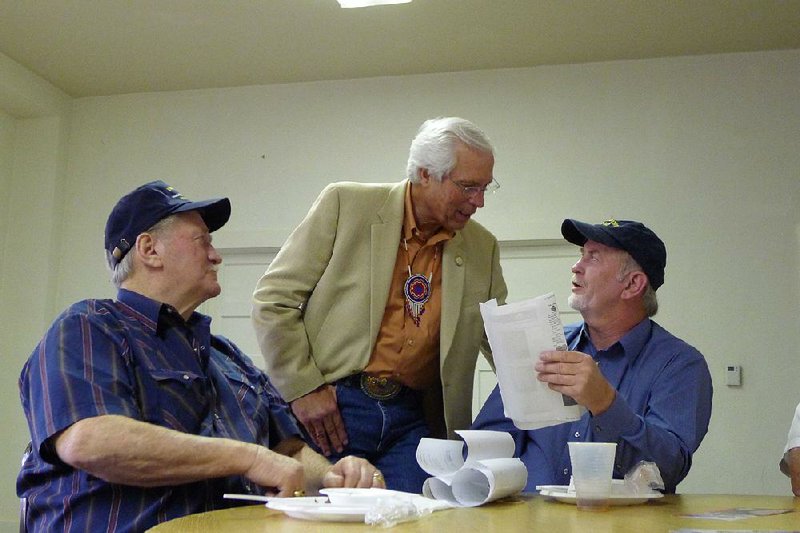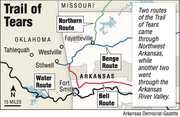FAYETTEVILLE -- The principal chief of the Cherokee Nation worked the crowd Monday night at Mount Sequoyah Methodist Assembly at a "meet and greet" with Northwest Arkansas Cherokees.
If not for the beaded necklace and bejeweled belt buckle, Bill John Baker would have looked like any other middle-aged Arkansas man in his jeans, cowboy boots and beige sports coat.
After four years in office, Baker, 63, of Tahlequah, Okla., is running for re-election as chief of the largest American Indian tribe. The election will be held June 27.
Although the Cherokee Nation is wholly within the borders of Oklahoma, Baker was campaigning in Fayetteville because about 1,700 of the tribe's 64,914 registered voters live in Arkansas, and many of them vote via absentee ballot.
Baker lost the 2011 election for principal chief by seven votes before a recount and special election put him in office.
About 10,680 of the Cherokee Nation's 315,000 citizens live in Arkansas, according to the tribal registration office. Most of them are in Benton, Crawford, Sebastian and Washington counties.
Fayetteville, in particular, is significant to the tribe.
"You can drive up and down the streets of Fayetteville and find some old Cherokee homes because many Cherokee settled right here," Baker told the crowd of about 50 on Monday. "Some of them had their families over here because it wasn't safe for them inside the Cherokee Nation after removal [from their native land in Georgia]."
Five tribes -- the Cherokee, Choctaw, Creek, Chickasaw and Seminole -- were forced to relocate under the Federal Indian Removal Act in 1830. There were four major routes from the Southeast to Oklahoma, three across land and one route along the Mississippi and Arkansas rivers.
The name Trail of Tears came from an 1831 article in the Arkansas Gazette. When a group of Choctaw Indians passed through Little Rock, the chief told a reporter that the forced migration was a "trail of tears and death." The term Trail of Tears later became associated with the 1838-39 removal of the Cherokee to Oklahoma.
An estimated 16,000 Cherokee people were forced to migrate during that time.
Two routes of the Trail of Tears came through Fayetteville, and Mount Sequoyah is named for a Cherokee citizen who invented the tribe's syllabary.
Sequoyah moved to Arkansas in 1824, according to the Encyclopedia of Arkansas History and Culture. He lived in the vicinity of Illinois Bayou in Pope County before moving to Sebastian County in 1828. At some point, Sequoyah camped on the mountain east of Fayetteville that bears his name.
The Cherokee Nation is based in Tahlequah, which is 58 miles west of Fayetteville.
The principal chief oversees a government with a $750 million annual budget and also provides supervision of Cherokee Nation Businesses, which generated more than $829 million in revenue last year from a variety of businesses, including casinos and hotels.
Baker has three challengers in the race. Chadwick "Corntassel" Smith, who was principal chief from 1999-2011; Oklahoma state Rep. Will Fourkiller; and Charlie Soap, who is the widower of former Principal Chief Wilma Mankiller.
In the June 2011 election, Smith initially defeated Baker by seven votes -- 7,609 to 7,602, according to the Cherokee Nation website, cherokee.org.
After a recount, Baker was ahead, but there were legal challenges. A special election was held in September, and Baker emerged as the clear winner with 54 percent of the vote.
David Cornsilk, a Cherokee from Oklahoma who attended Monday's event, said the difference between Baker and Smith -- the perceived front-runners -- is similar to the difference between Democrats and Republicans. Like most Democrats, Baker supports social programs to promote health care and inexpensive housing for lower-income tribal members, Cornsilk said. Smith, he said, is more concerned about business interests.
The biggest problem is apathy, Cornsilk said. Only about 11 percent of qualified voters turned out for the 2011 election for principal chief, he said.
Smith, 64, said the tribe's politics traditionally have been nonpartisan, but Baker introduced a "Democratic political machine" for his 2011 campaign.
"The [2011] Baker campaign was heated because it was the first time mainstream politics was introduced into the election," Smith said. "Before that, it was a mom-and-pop kind of deal. You put up signs and had hog fry."
When asked for a response, George Shelton, a spokesman for Baker's campaign, emailed a comment from the chief that didn't address the "political machine" accusation.
"By the end of this year, the Cherokee Nation and its businesses will have more than a $1 billion mark on Oklahoma's economy," Baker said via email. "Our health care system had more than 1 million patients visits last year and we gave out over 4,000 scholarships last year to Cherokee students. We have some of the most talented people in the world running our businesses and governing our Nation. And more of those exceptional people doing that work are Cherokee than at any time in our past. We are proud of our growth as a nation, we believe in what we are doing, and our campaign is communicating that to voters."
Smith said the value of Cherokee Nation assets grew from $150 million to $1.2 billion during his 12 years as principal chief. Also, he said, 5,000 jobs were added and health care expenditures grew from $30 million to $300 million during those 12 years.
Smith said he has yet to campaign this year in Arkansas, but he will. He said Arkansas probably ranks about fifth in the nation in the number of registered Cherokee voters.
He said California has the most Cherokee voters outside Oklahoma. About half of the Cherokee Nation's 40,000 citizens moved from Oklahoma during the Dust Bowl of the 1930s, with some settling in Texas but most going to California.
Other waves of "expatriation" came during World War II and the 1970s, as Cherokees left Oklahoma looking for work, Smith said.
So far this year, Smith said he has campaigned in Arizona, California, Colorado, Florida, Kansas, Missouri, New Mexico and Texas.
But Arkansas is an important campaign destination, he said.
"They can make or break an election quite easily," Smith said.
Metro on 04/22/2015

